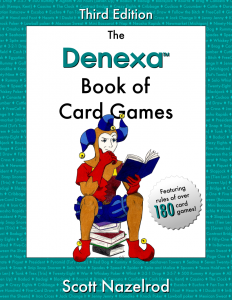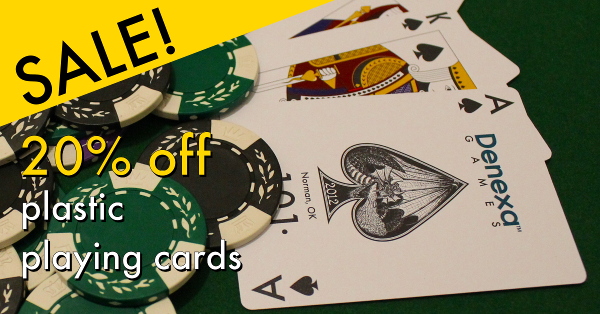Tyzicha
Tyzicha is a Russian card game for three players. In this trick-taking game, the trump suit changes every time a player reveals a king and queen of the same suit. That means which suit is trump can change several times over the course of a hand!
Object of Tyzicha
The object of Tyzicha is to be the first player to reach a score of 1,001 points. Points are scored by accurately bidding on the number of points that can be made on each hand and proceeding to collect those points.
Setup
Tyzicha is played with a 24-card deck. To obtain one, start with a deck of Denexa 100% Plastic Playing Cards. Remove all of the 8s through 2s, leaving 9s through aces in each of the four suits. It’s a good idea to hold on to a full rank of the discarded cards (such as all the 2s) to serve as trump markers. You’ll also need pencil and paper for scoring.
Shuffle and deal seven cards to each player. Place the remaining three cards face down in the center of the table, forming the widow.
Card ranking
The cards rank slightly out of their usual order in Tyzicha. The 10 is ranked just below the ace, but above the face cards. That means the full order of card ranking is (high) A, 10, K, Q, J, 9 (low).
Game play
Bidding
Before the hand actually starts, the bid for the ensuing hand must be determined. The player to the dealer’s right bids first. They may either make an opening bid of 110 or pass. The next player to the left (the dealer) has the chance to bid or pass next. Once someone has bid 110, the next player may raise by ten points to 120, or else pass. A player may not raise by anything other than ten points. When a player passes, they drop out of the bidding and cannot bid again on that hand. When two players have passed, the remaining player becomes the declarer, and their bid becomes the contract for the hand.
Should the first two players pass on the first round of bidding, the third player (the player to the dealer’s left) is forced to play. A forced player may opt to accept a typical 110-point bid as usual. However, they also have the special option of making a contract of only 100 points. While this reduces their risk in the ensuing hand, it also limits their pre-hand options slightly, as described below.
The widow
After the bidding is concluded, the declarer turns the widow face-up. Once their opponents have seen it, they take it into their hand. They then choose one card from their hand (either one of the cards they had before, or a card from the widow) to give, face up, to each of their opponents, bringing each player to eight cards.
If, after exchanging cards, the declarer believes their hand has improved, they may choose to raise their bid. Raises must be a multiple of ten points. On the other hand, if they feel they are unlikely to make their contract, they may concede the hand. They deduct the value of the bid from their score, and each opponent scores 40 points. The hand is then over at that point.
If the declarer was forced and bid only 100 points, there are slightly different rules for dealing with the widow. Neither the widow, nor the cards passed to the opponents, are turned face up. Also, the declarer’s bid is locked in at 100; they cannot raise beyond this. A player with a bid of 100 may still choose to concede, however.
Play of the hand
The declarer leads to the first trick. Each player must follow suit, if possible. If not, they must play a trump; only if they have neither a trump nor a card of the suit led may they play a card of the other two suits. Players must also head the trick. That is, they must play a card able to win the trick if they have one they can legally play. The highest trump played to a trick wins it. If no trump was played, the highest card of the suit led takes the trick. Won tricks are not added to the hand; instead, they are placed in a won-tricks pile in front of each player. The player that won the trick leads to the next one.
Initially, there is no trump suit. If a player has a king and queen of the same suit when it is their turn to lead, they may reveal both of these cards as a marriage. They must then lead either of them to the trick. The trump suit then changes to that of the marriage. Which suit is trump may change multiple times per hand as players reveal further marriages. To remind the players of the current trump suit, keep an out-of-play card of the appropriate suit displayed, changing it as necessary.
Scoring
Once all eight tricks have been played, the hand is scored. The declarer totals the value of the cards they captured in tricks. Aces are worth eleven points, 10s are worth ten, kings four, queens three, and jacks two. 9s have no point value. To this total, the declarer adds the value of any marriages they revealed in the hand. A marriage in hearts is worth 100 points, in diamonds 80, in clubs 60, and in spades 40. If the combined total exceeds the contract value, the declarer has made their contract.
A declarer that fulfills their contract scores the value of the contract (not their hand total). If the declarer breaks contract, they subtract the value of the contract from their score instead. In this case, the declarer’s opponents also score the value of their hand (calculated the same way as is done for the declarer).
The deal passes to the left and new hands are dealt. Game play continues until a player reaches a score of 1,001 or more points. A player is capped at a score of exactly 1,000 points when not the declarer, meaning players must make a contract on their final hand in order to win the game.



Leave a Reply